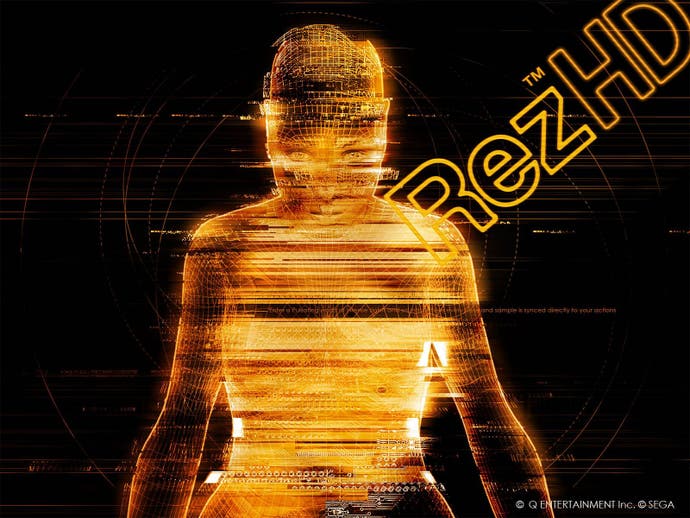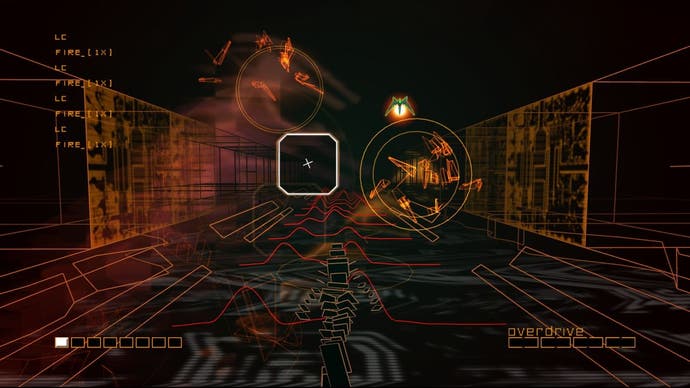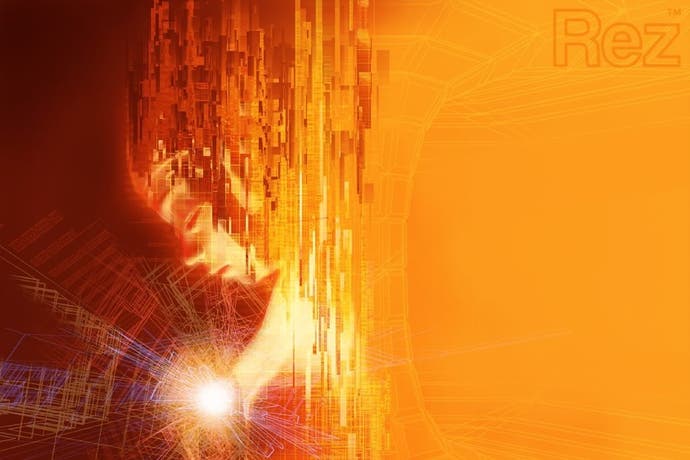Rez's perfect 60 minutes
Screw finding gaming's Citizen Kane, we've already got its 2001.
You can play through United Game Artists' Rez from beginning to end in less than an hour, which, in an age where size depressingly does matter to so many, could be seen as a slight against this music-infused rail shooter. That hour, though, comes closer to perfection than any other video game I know.
What wonders that 60 minutes holds: the vector-lit void that slowly fills with dancing detail, the first ripple cascade of beats that builds towards anthemic euphoria, the running man. The sweet skunk thud of Joujouka's track that builds up to Rez's most iconic boss at the climax of level four, or the desolation of the level that follows, moodily soundtracked by Adam Freeland's Fear is the Mind Killer. The moment when you MDMA rush out of the sea, towards a sky squirming with cannon fodder as a suite of stuttering, swirling strings giddily charts your ascent.
Or the end of the third level, as you dance alongside a swarm of bots, the firewalls that protect the boss tumbling dramatically down. It's true that, with a bleakly reductionist view, Rez is simply a successor to more earnest fare such as Panzer Dragoon, only in which your arsenal is transmuted to drum machines and synthesisers, where cannon fire is switched out for 808 thumps and missiles are swapped for high energy 303 stabs.

In that dance, though, the strange chemistry snaps into place as you learn to play in time. Your actions are quantised so you never miss a beat, but Rez still invites you to lock and shoot along in rhythm, to tap away in perfect harmony and then add your own plastic-pushed fills and rolls.
I've returned to that hour countless times and in countless ways over the years: on a humming CRT on the floor of my sister's living room, cross-legged on a bean-bag in a Brighton basement as brief respite from a summer trip shortly after its release, and even with a girlfriend's Trance Vibrator imported from Japan stuffed tastefully down the back of my shirt. Playing it sober, and with hindsight, Rez's power hasn't diminished. If anything, the years have only amplified its genius.
There's serious craft in Rez, but it transcends workmanlike wonder to become something else. What I love about this deceptively simple game isn't how it plays with what games are, but how it wistfully dreams about what games could be. Rez conjures up a sci-fi world with its code, but the game itself, with its dancing colours, its swirling palette of techno and its eccentric embrace of vibrating peripherals, feels like something that's leapt from the thin tan pages of 60s sci-fi. It's the video game as imagined by an optimistic, bright-eyed futurist.
Rez feels like the entertainment Arthur C Clarke might have conjured for the inhabitants of his techno utopias, and he once came pretty close to pinning down designer Tetsuya Mizuguchi's strain of kinetic art. There's a fascinating aside in Clarke's essay Man and the Machines, a look at how humanity would deal with the ever-escalating processing power of computers. "Ultraintelligent machines will make possible new forms of art," wrote Clarke, "by introducing the dimensions of time and probability... The insertion of an intelligent machine into the loop between a work of art and the person appreciating it opens up some fascinating possibilities."
The observation would no doubt tickle Mizuguchi, who sprinkles hints of deference to 2001: A Space Odyssey - the Stanley Kubrick collaboration with Clarke, and a variation on the writer's short story The Sentinel - throughout Rez. There's the errant AI, the space baby and the final thunder crash of evolution in the closing act - plus the fact both go nicely with a microdot washed down with a glass of red.

It's a fool's business playing like for like with films and games, but Kubrick's sci-fi masterpiece and the heavenly Rez have something else in common, too - they're both completely, utterly in love with their own chosen mediums, 2001 with its sparse dialogue and forcefully staggering visuals an expression of pure cinema, Rez with its embrace of the player and its sensory overload a perfect embodiment of what's possible with games.
That's hyperbole, of course, but it's deserved - few other games since have wielded the same kind of power. Child of Eden, the spiritual successor that came a full decade later, was a fine game though its aesthetic suffered with the absence of Rez's lead artist Katsumi Yokota - and in place of the hard-edged cool of the original there was something more akin to a poster in a Glastonbury gift shop. You can see elements of Rez every day, though - explicitly in the likes of Dyad, Audiosurf and Everyday Shooter, or implicitly in the synaesthetic joy of exploring Ed Key and David Kanaga's Proteus. That's another game that, like Rez, has the ability to lift your mood within seconds of giving yourself over to its abstract world.
There's nothing that comes close to the swelling thrill of Rez, though. You can play through it in an hour, and if you haven't recently I strongly suggest you go back and do. There's quite likely no finer 60 minutes in all of video gaming.









